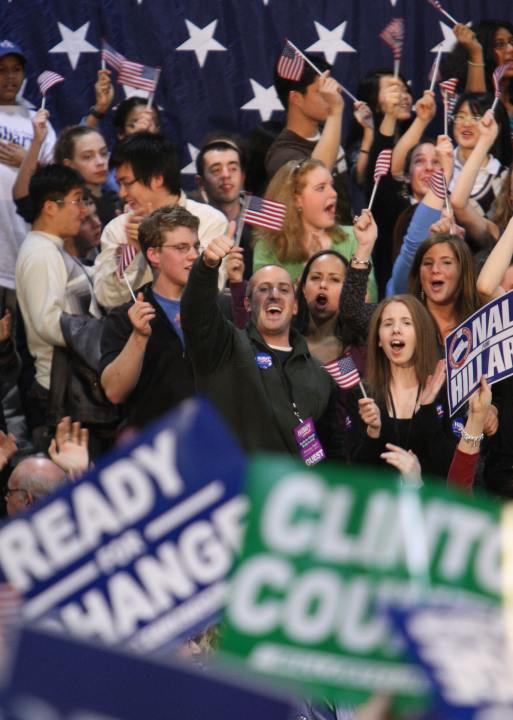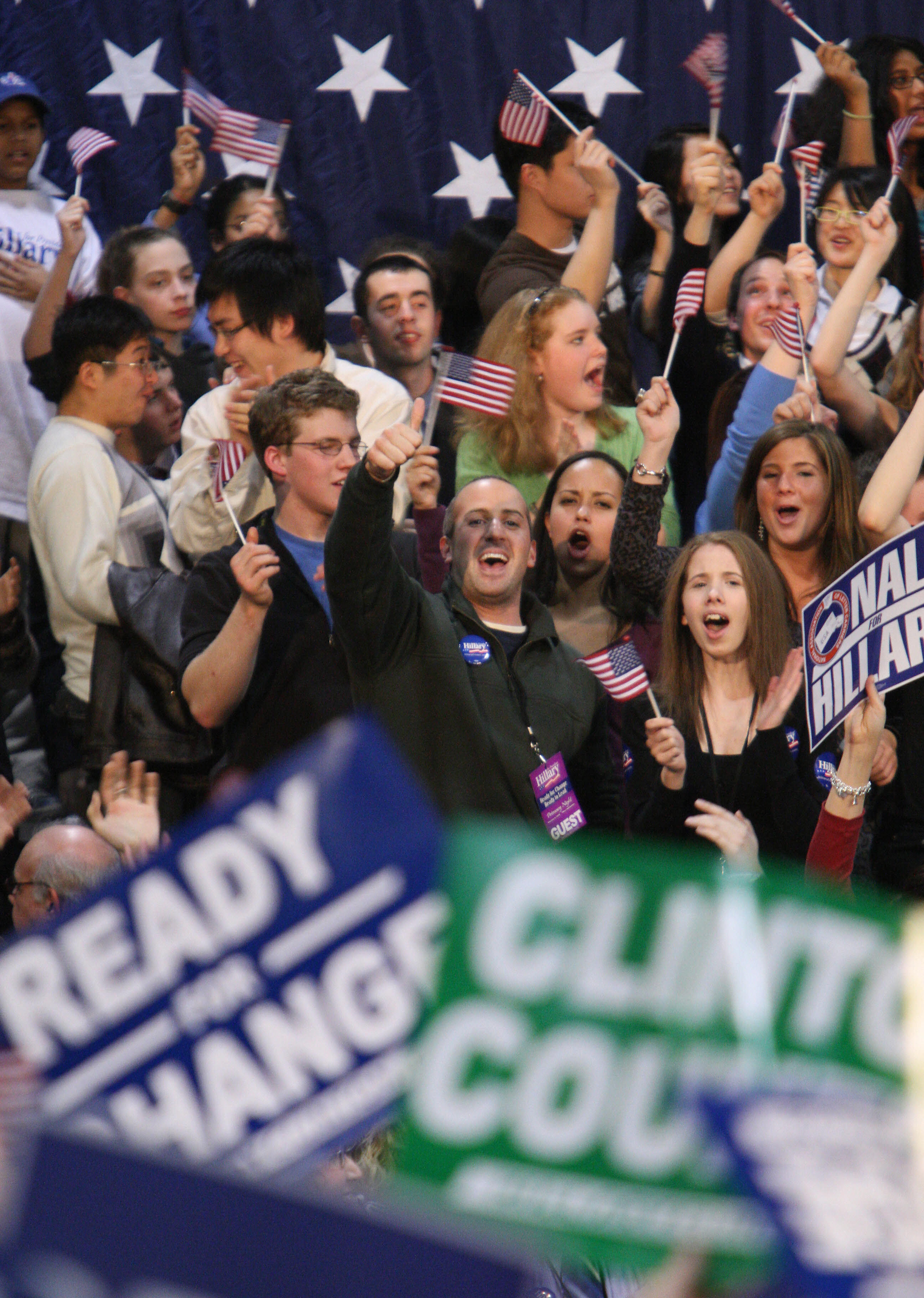As the US presidential race gathers steam, Westminster is abuzz. Like the Derby Trials, MPs across the political spectrum are watching their horses anxiously. Some are seasoned observers. They know the trainers and even the thoroughbreds themselves. Others are more recent spectators, but with no less passion. The outcome of the presidential election matters in Westminster, for the course of US policy certainly, but also for UK domestic politics.
 As the US presidential race gathers steam, Westminster is abuzz. Like the Derby Trials, MPs across the political spectrum are watching their horses anxiously. Some are seasoned observers. They know the trainers and even the thoroughbreds themselves. Others are more recent spectators, but with no less passion. The outcome of the presidential election matters in Westminster, for the course of US policy certainly, but also for UK domestic politics. It matters too for the ‘special relationship’, but less so than one might think. While politicians pick and choose their candidate, foreign office mandarins are working stealthily below the radar screen to ensure continuity in US relations, whoever wins in November.
As the US presidential race gathers steam, Westminster is abuzz. Like the Derby Trials, MPs across the political spectrum are watching their horses anxiously. Some are seasoned observers. They know the trainers and even the thoroughbreds themselves. Others are more recent spectators, but with no less passion. The outcome of the presidential election matters in Westminster, for the course of US policy certainly, but also for UK domestic politics. It matters too for the ‘special relationship’, but less so than one might think. While politicians pick and choose their candidate, foreign office mandarins are working stealthily below the radar screen to ensure continuity in US relations, whoever wins in November.
So far, Gordon Brown has refused to speculate on the race: it’s ‘a matter for America’ the Prime Minister insists. But Labour’s links with the Clintons, some 20 years old, remain a powerful force within his party. A Clinton victory would be a welcome shot in the arm for Brown, a demonstration that the centre left remains viable at the polls. Barack Obama also has a significant following amongst Labour MPs, but ties are less advanced. Hillary’s supporters stress Obama’s lack of experience, particularly in foreign affairs. The unmistakable message of change delivered by an Obama victory would also rankle with Downing Street. Talk of change is one of Cameron’s most potent weapons, and Brown has yet to develop a convincing rebuttal.
Among many Conservatives, support for the Republicans, their sister party, runs deep. Groups such as Liam Fox’s ‘Atlantic Bridge’ have cultivated ties over the years, riding through the difficult period in US relations under Michael Howard, now referred to obliquely as a time of ‘personality clashes’ by senior Tories. Links with John McCain, Rudy Giuliani and Mitt Romney, many developed personally by Fox and George Osborne, remain strong. Mike Huckabee less so. ‘He’s just off the wall’ said one Tory MP.
David Cameron recently declared himself a ‘great admirer of John McCain’. The Arizona Senator addressed the Tory Party Conference in 2006 and is considered the favourite amongst Tory MPs today. ‘I think his whole style: understated, self-deprecatory, wry and his background, a veteran, fits more neatly with Anglo-sensibility than any other candidate’ said one Conservative MP. McCain’s tough foreign policy stance, and his support for tackling climate change, also chimes with Cameron’s approach. Perhaps most importantly for Camp Cameron, a McCain victory would show that elections can be won by shifting a right wing party towards the centre, a welcome message indeed.
Intriguingly, Cameron has also spoken of ‘enjoying watching Barack Obama’: last year his office tried, albeit unsuccessfully, to arrange for the two to meet during Cameron’s visit to Washington. Cameron is too shrewd a politician to expect such gestures to go unheeded. His approach has given hope to a Democratic counterinsurgency, alive and well within the Conservative Party. Simon Burns (MP for West Chelmsford) has little time for Obama, but is an outspoken Hillary Clinton supporter. He volunteered for her campaign in New Hampshire earlier this month and has the T-shirt to prove it. ‘Being a Clinton supporter in the 1990s was a very lonely position in the Conservative Party’ he recalled. ‘That began to change in 2002/3.’ Distaste for George W Bush pushed support for the Democrats to its high watermark in 2004. Since then, as the end of the Bush era draws nigh, support for the Democrats has diminished, but not disappeared.
‘There are a number of female Tory MPs, more to the right than I am, who have supported Hillary for ages’ insists Burns. Could this be evidence of a growing constituency for the Democrats? ‘There’s a growing constituency within Simon Burns’ snapped Fox, who considers this Clintonista within his ranks pure aberration. But Conservative support, at least for Obama, is widespread. As one Tory MP put it, ‘in the same way that Obama offers America the chance to put some of its turbulent past behind it, a number of younger Conservatives resent the way that their party is sometimes seen as reactionary. Support for Obama is a chance to exorcise certain ghosts.’ As with McCain, a gentle nod to Obama is an attempt to mark Cameron out as a different kind of Tory leader. To his critics, Cameron is ‘playing with fire’, risking long term Republican ire for the sake of fleeting domestic popularity. Any further overtures to the Democrats, they warn, and a Republican victory in November could leave Cameron frozen out in Washington, a dangerous situation in the run up to the next British General Election.
These fears, while real enough, should not be taken too far. As Fox stressed, “the ‘special relationship’ is too important to belong to any particular party, or to be dependent on the personal relationship of individuals’. Pre-existing ties can alter the relationship in degree but rarely in kind. Calculations of national interest by incumbent governments are, of course, crucial to its continuity. But so is early intimate knowledge of a new President’s inner circle. Here, the British Embassy in Washington, DC comes into its own.
While British politicians feel compelled to discriminate amongst presidential candidates during the campaign, Embassy officials do the exact opposite. Their task is to build links to all candidates, regardless of political stripes: ‘it’s like an insurance policy’ said one diplomat, albeit often mistaken for a crystal ball. ‘What London always wants is a prediction’ bemoaned Sir Christopher Meyer, Ambassador during the contentious 2000 US race, ‘it makes life living hell for the Ambassador’. This year, the Embassy has fought off similar demands from their political masters to date: ‘We just don’t know who’s going to win’ admitted one diplomat, ‘but we’re not exactly in a minority of one on that.’
With the exception of Huckabee, whose surge took British officials by surprise, the Embassy has entered the primary season boasting strong relationships with all key contenders. The challenge now is to build on these links, drawing on the ingenuity of Embassy officials. In 1992, Jonathan Powell, then Political Secretary at the Embassy and later Tony Blair’s Chief of Staff, managed to talk his way onto the Clinton campaign bus during primary season. He stayed put, in this extraordinary privileged position, throughout the campaign. As then Ambassador Lord Renwick recalled, ‘there came a point when Clinton had to be reminded that Powell wasn’t one of his staffers.’ In 2000, Political Secretary Matthew Rycroft (now Ambassador to Bosnia and Herzegovina) enjoyed similar success, gaining acceptance within the George W Bush campaign, where he was able to nudge Bush’s aides gently towards the British position on Northern Ireland . The links forged by Powell and Rycroft endured and proved invaluable when Presidents Clinton and Bush took office.
So no matter whose name is being whispered in the corridors of Westminster today, the ‘special relationship’ will endure beyond the 2008 election. Somewhere in the heartlands of America there is a man with a British accent on a campaign bus, or a plane, forging a network of links with the next President of the United States. What the British Prime Minister decides to make of these links come next January is another question entirely.







Comments